After taking our regular noon siesta, the horses
were resaddled and we began a long, long ride to Camp 4. Once we
got mounted and moving, the sun wasn't so bad and I didn't mind so much
leaving the shade. From my GPS, I knew we had an awfully long way
to go that afternoon and was hoping we'd make good time like we had earlier
that morning. For quite some time we did continue to make good progress
and the riding was pleasant even if the sun was sometimes pretty hot on
you.
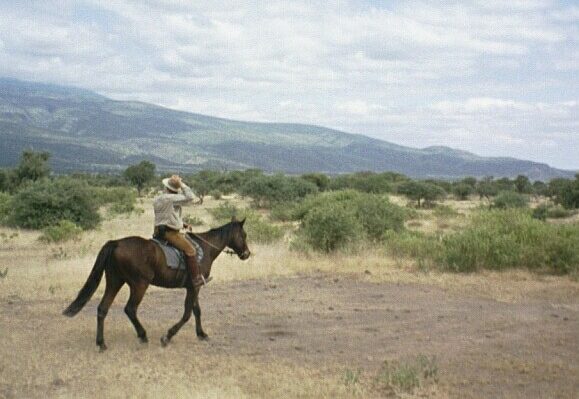
It's cooler if you tilt your hat to the sun and leave as much
of your head under the hat as possible uncovered.
Looks funny but it works.
Picture compliments of Dr. Kolblinger.
At this point I'd like to mention that I had
a pretty good idea where we were heading this day. While we were
still back at the Farm, I had shown Tom and Jan my map and my guesses at
what route we'd take. Turned out my speculations were pretty accurate regarding
the overall route, but I didn't even try to guess where our camps and lunch
stops would be. One camp location Tom was pretty sure of was Camp
4 near the base of the Oldoinyo Lengai volcano. He pointed to a place
on the map and said that's about where we'd be making for. I took
the latitude and longitude coordinates from the map and programmed them
into my GPS as an experiment. That's how I knew we had many miles
to go that day.
The area were riding through was basically savannah
with some thick groves of thorn trees and heavy shrubs. Because vegetation
was thick in places, many times we couldn't ride to a fixed direction all
the time. We would zig zag to avoid tangled masses of trees and shrubs,
but always head in the general of Mt. Lengai.
It was while riding here that I first noticed
something rather funny but also something rather annoying. If Bernard
or I would allow our horses to take the lead and we would wend our way
through the landscape in a certain direction, Lisa would take the opposite
tack and would ride away from us so that we had to change direction and
hurry to catch up. As soon as we had caught up, she'd change direction
to back where we had been heading. Most of the time I would have
been very happy to ride behind her with the others, but there were times
my ill behaved horse wanted to get going and be out in front. I knew
it was some kind of game Lisa was playing with us, but she was the "trail
boss" and it was her safari, so I just played along with it.
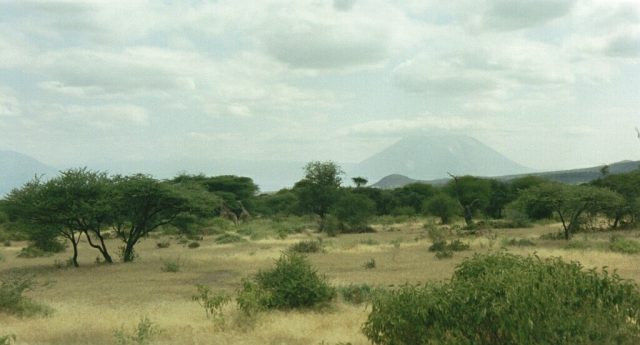
Mixed savannah and woodlands.
Giraffes near the center of the picture.
Compliments of Dr. Kolblinger
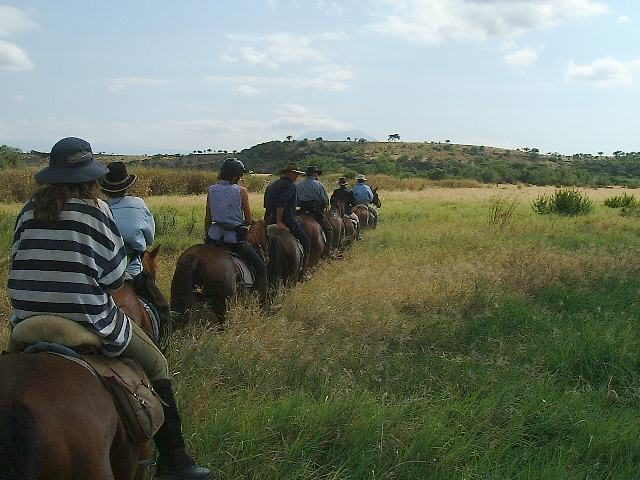 Riding through the grasslands.
Riding through the grasslands.
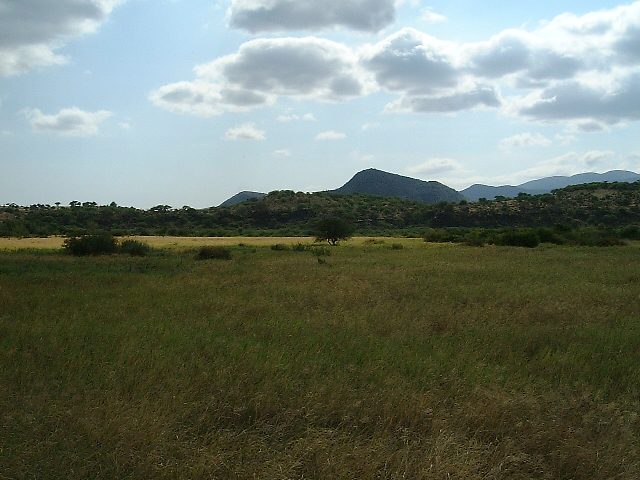 Up ahead a ridge blocked our way.
Up ahead a ridge blocked our way.
There was game out there and sometimes
in the covers of thick vegetation we could see giraffes and zebras.
Once I rode past a really neat snake and tried to call the others back,
but they were already far enough away they didn't understand what I was
shouting about. The amount of game out this way was not nearly as
abundant as we saw yesterday and (to tell the truth) I was pretty jaded
when it came to game viewing by this time. Finally we got out of
the mixed woodland and into tall grass (really tall grass). We came
across a rather large herd of donkeys being tended by some Masaai boys.
Up ahead I could see a line of hills that formed a ridge and seemed to
be blocking our way.
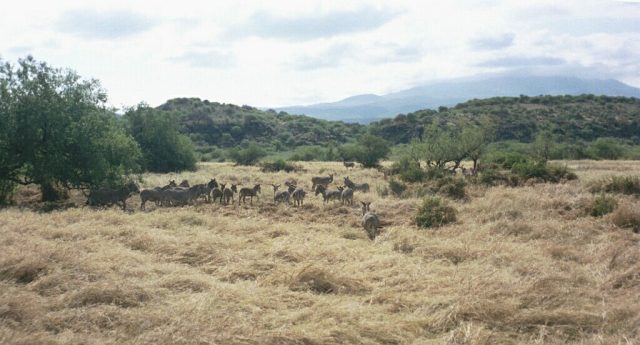
Herd of donkeys belonging to native boys.
Ridge beyond.
Compliments of Dr. Kolblinger
Monitoring our progress with my GPS, I could
tell that we were pretty much on course even if not always in a straight
line. As we came up to the ridge we could see that it completely
blocked our way. This really was a major check. Our side of
the ridge was a deep grassland with clumps of vegetation so high and thick
you couldn't ride the horses through it. I think we might have been
a little lost here because the Danish language could be heard (if not understood)
by all and because we made some back and forth treks along the ridge while
looking for a pass over it. We needed to get over the ridge as soon
as possible because we still had a long way to go and the afternoon was
wasting away. I offered to scout on foot what looked (to me) like
a promising, but rocky trail up the ridge if somebody would hold my horse.
I was a little surprised and a little offended when Tom forbid any of the
"guests" from doing anything like that. "If anybody does that, I
will."
Finally we found another trail a bit wider
and better looking than my trail. Tom went up on foot, came back
down and then we all proceeded to lead the horses up on foot. To
get out of the saddle and to climb up a trail on foot was a blessed relief
and I enjoyed it very much. Believe me, after you've been riding
for hours, there is nothing better than a good march on foot to get the
circulation going in your feet, legs and butt.
Not too long after getting
over the ridge most of the others (except Tom and me) got back on their
horses. After a refreshing little hike, I finally mounted my horse
too and we continued through some grassland until we came to a rocky hill.
Some got off and made some saddle adjustments. I got off and made
a little bladder adjustment.
A little "pit stop" on a rocky hill.
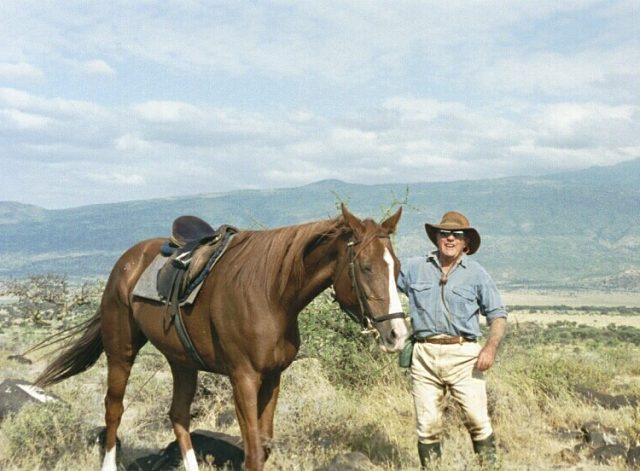
Terry.
Above three pictures compliments of Dr. Kolblinger
As we continued riding we started seeing clusters
of native bomas way in the distance and the first signs of overgrazing.
Ok, so I'm no expert on range management, still it was obvious to even
the like me that these native people were not living in balance with their
natural environment. The people out there, except for their machine
woven robes and spears with forged iron tips, possess no accouterments
of modern industrial civilization. Although their level of technology
is not much different from those eras many of us associate with the childhood
of the human race, they are not living in harmony with nature. Indeed,
as we were to see, there was every evidence of erosion and environmental
degradation and it got worse and worse the closer we got to their settlements.
By now the erosion was so bad that
the land was crossed by deep gullies and we had a hell of a time finding
ways down into them and then out again. We had to go out of our way
and backtrack several times and find alternative routes through some of
these heavily eroded ditches. This region was environmentally fragile,
but the natives and their damned goats had ruined it beyond all help.
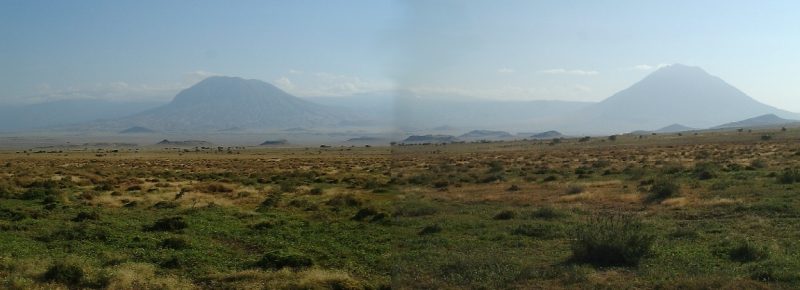
First signs of native settlements.
Mt. Lengai to the right.
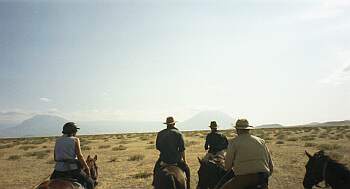
|
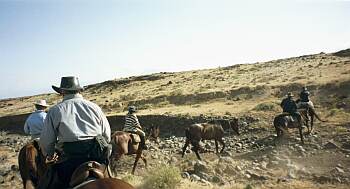
|
| Riding toward our next camp. |
Crossing an eroded gully.
There were lots of deeply eroded gullies |
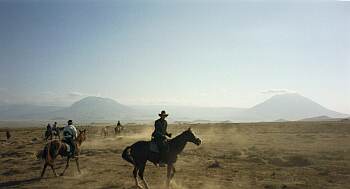
|
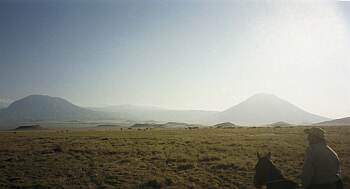
|
| Pretty much bare ground showing severe overgrazing. |
Oldoinyo Lengai to the right.
The wind was blowing at about 20 knots or so out there. |
Above four pictures compliments of Dr. Kolblinger
As the shadows were lengthening and the
late afternoon was turning into early evening, we came across a amusing
sight. Here, right out in the middle of Nowheresville, East Africa
was a big truck stuck in a ditch with a couple native guys trying to dig
it out. We learned that the truck and the two guys had been hired
to ferry supplies out to us when Jan realized that the Bedford wouldn't
be able to carry enough for the entire trip. A day later we really
needed that truck when the Bedford broke down, but I'll get to that later
.
Stuck truck
2 degrees, 47.031 minutes South Latitude
36 degrees, 4.221 minutes East Longitude
3215 Feet above Sea Level
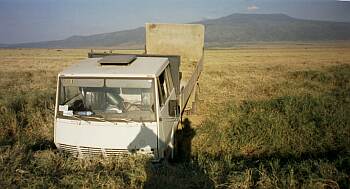
|
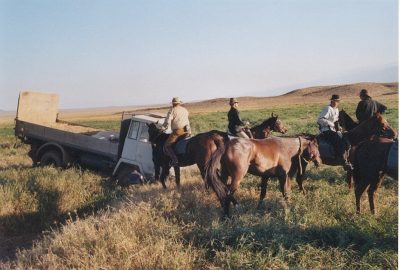 |
The truck was stuck.
The shadows were getting long.
Notice the horse head shadow
I made with my hands - pretty good huh?. |
Looking over the situation.
That truck was going to take
some work to get it out. |
Pictures compliments of Dr. Kolblinger
Those poor guys. There it was, getting
towards sundown and the truck was deep in a ditch. Tom, Lisa and
I came to the conclusion that they would never get the truck out before
sundown and especially with the few tools they had - I don't remember that
they even had a shovel. Anyway, Lisa and I agreed that they would
have to jack up the front and get it level by putting sacks of grain (from
the cargo in the back) under the tires so it would be level and could be
driven out.
We were so sure that they would not be able
to get themselves out that Tom asked me to take a GPS fix on the location
so we could find it again in the dark and we planned to return with the
Bedford, tow ropes and tools after making camp and putting up the horses.
I was most pleased to take the geographic fix on their location and to
offer my services that evening.
The ride still had a way to go before getting
to the camp and it was getting late. My GPS said we were within a
few miles of camp, but it was starting to be obvious that the guesses we
had made on the map back at the Farm were a little off. As it turned
out, our actual camp was about a mile and a half east and north of where
my GPS had been programmed for. Still, I thought that was pretty
darn good for a guess.
Before going on with the story I need to digress
a little and say something about horses.
There's an old cowboy saying: "Mules are best
for work, but a horse will never let you down." Indeed, mules are
wonderful creatures - smart, tough and strong. The only problem with
a mule derives from the virtue of their intelligence. A mule is smart
enough to know when it's done enough work and when it's time for it to
be rested and fed. If you foolishly exceed either, the mule will
stop on you and no power short of a bulldozer will move them.
Horses are not as smart as mules and they will
obey you long past their point of exhaustion from hunger and fatigue.
When the chips are really down, horses will keep on going. There
is a price to pay if you don't rest them or feed them when you should.
If the horse is of a quiet and slow temperament
(like draft horses, some quarterhorses and some 'warmbloods') the animal
will get really sluggish as hunger and fatigue sets in. My quarterhorse,
Rusty is like that. He's a ball of fire when he's fresh, but really
drags when he gets tired.
If the horse is a 'hotblood' like a barb, an
Arab or a thoroughbred or thoroughbred cross, things can be quite different.
Hotblooded horses generally get more and more nervous and upset as they
become fatigued and as their dinnertime comes and goes. I've had
thoroughbred horses explode and become completely unmanageable after a
long and exhausting fox hunt. I noticed similar things happening
with the horses on this safari.
Let me tell you, the riding times between stops
were not well planned, not well planned at all and almost every day we
came to camp way, way too late in the evening. It was not fair to
the horses and not fair to the riders. The horses were very hungry,
thirsty and exhausted by then. Being mostly thoroughbreds or thoroughbred
crosses (as far as I could tell) they acted like you'd expect hotbloods
to act. They would get quite upset and harder to ride as the shadows
deepened. Many evenings as we approached camp I'd be riding an upset,
hardly manageable horse in a foul mood and I'd likewise be dead tired,
have a sore back (and butt), a headache and be in a foul, foul mood too.
This had been a long, long day and it still
wasn't over. The animals and people were tired. Approaching
camp this particular evening in the near darkness, I and my horse were
feeling all those things described above, foul mood and all. Again,
at about 150 yards from the picket line (that you really couldn't see in
the gloom) we raced toward it at a full, mad gallop.
Oh, I was mad! Oh, I was PISSED!!
I completely lost it - I came unglued - my cork popped - I went ballistic
- I went ape - I nearly went postal. You might even say that
I was aggravated. I mean to tell you my friends, I literally went
into one of my infamous "Berserk Elephant" impersonations and did a damn
good job of it too.
I brought my horse to a stop about 20 yards
from camp while the others whizzed by me. I got off and walked the
horse to the picket line and when I got there I started jumping up to show
everybody where the picket line was in the dark and started shouting how
foolish it was to gallop into camp like that. I shouted how it was
a violation of every safety rule and the most basic rules of common sense.
I again told about how my comrade got his back broken and went on and on
like a madman in that same vein. Jan came running over to see what
the shouting was all about (I bet he thought somebody was killed) and I
guess I'm lucky he didn't deck me then and there - God knows I probably
deserved it.
I quickly untacked the horse and left it there
tied to the picket line for the staff to water and feed. I really
needed a drink. After I had cooled down and had a slug of some liquor,
I really felt bad and thought I should apologize to Lisa. I was too
ashamed of myself to even apologize (what a guy, huh?).
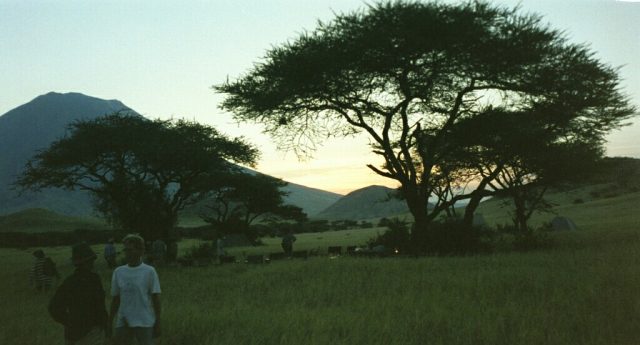
A late arrival to Camp 4.
2 degrees, 46.309 minutes South Latitude
36 degrees, 0.624 minutes East Longitude
3137 Feet above Sea Level
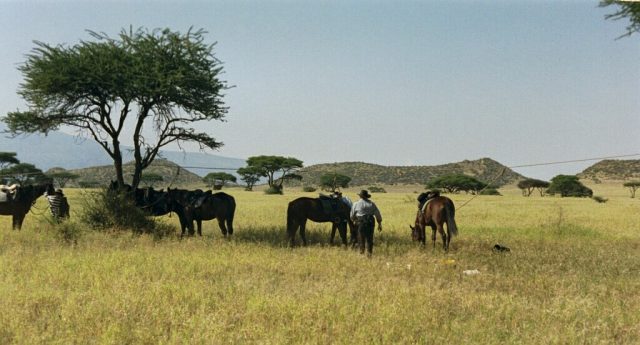
Picket line high enough to be dangerous.
Pictures compliments of Dr. Kolblinger
While I was off brooding nearby, I was surprised
when Tom came up and asked if I still wanted to help pull the other truck
out of the ditch. Of course I did, I was glad to redeem myself a
little. Tom, Jan and I loaded up into the Bedford and we started
out in the dark for where we knew the truck would be.
We got about half way out there when we saw
lights coming at us. What was all this, who were these people way
out there? Mon Dieu, it was the truck and somehow the two guys had
got the thing out of its ditch. We stopped and Jan had a talk with
them, then we turned around and lead the way back into camp.
When Jan got back in the truck, I asked him
if the guys told him any details on how they got themselves out of the
ditch. Jan said he asked them, but the only answer they'd give him
was "we tried very, very hard." Very hard indeed.
When we got back into camp it was pitch black
out and I didn't know the Bedford was parked right next to a thorn bush
on my side of the truck. When I started climbing down from the Bedford
I lost my footing and landed right in the bush (fortunately) on my back.
I was stuck. I couldn't use my arms and hands to pick myself
up and I couldn't roll out of the bush. It hurt to be in there, but
there wasn't anything I could do to help myself. Was I ever stuck.
Fortunately Tom noticed my predicament and helped me out. I was poked
in a couple of places and bleeding slightly, but told him that only my
pride had been seriously injured.
By the time we all got back, supper was ready
and the meal was most welcome. I was feeling kind of bad so didn't
stay up too late. Before turning in I was glad to learn that we would
not be starting early the next morning and we'd have time to explore and
admire this beautiful, wild country we were now in.
Earlier I mentioned that there came a time
when Terry's snoring would no longer bother me. What I meant was,
Terry would no longer be my tentmate. Without asking my opinion or
preference, Lisa announced that I would be sharing a tent with Dr. Kolblinger
from now on. For some absurd reason, this sudden announcement made
me angry. It's not that I liked having Terry as a tentmate, but I
really didn't mind him as a tentmate either. As a matter of fact,
by preventing him from snoring all night I thought I was doing him a favor
and (crazy as this sounds) I like being helpful.
I didn't actually say this to Lisa, but I was
thinking; "so what's the problem Terry's having with me?!? Bad breath?!?
Body odor?!? Talking in my sleep?!? Snoring?!? The truth
is, I was kind of hurt that Terry obviously didn't like my company to the
point that he actually asked Lisa for a change. While I was still
thinking of something to say and before I could get any words out, it dawned
on me that this was actually a very good development and rather than feel
hurt, I should feel elated. Maybe Terry thought he was doing me a
favor - yes that was probably it. Finally I said; "Oh OK, if it's
fine with Dr. Kolblinger, then it's fine with me." I don't know how
it subsequently worked out for Terry (not having anybody to stop his snoring),
but it worked out well for me and I hope it was OK for Dr. Kolblinger too.
I turned in early and listened to my short
wave radio through my headphones. I tuned into to some English broadcasts
of the news and then went to sleep. Having Dr. Kolblinger for a tentmate
worked out fine and I slept through the night with no interruptions.
Go to Chapter 12
Return to table of contents